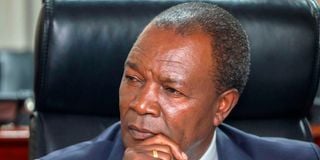Premium
Treasury CS Njuguna Ndung’u barred from bank interest rates case

National Treasury Cabinet Secretary Njuguna Ndung'u.
Treasury Cabinet Secretary, Njuguna Ndung’u, has been barred from joining a suit in the Supreme Court that seeks an interpretation of the law on interest rates.
Chief Justice Martha Koome and four other judges rejected the application by Prof Ndung’u through Attorney-General Justin Muturi to join the case, saying the request was made after unreasonable delay.
The case stems from an appeal by Stanbic Bank seeking the interpretation of Sections 44 and 52 of the Banking Act and whether the interest rate applied by a financial institution is subject to the approval of the minister.
The court agreed to hear the dispute between the lender and a former customer – Santowels Ltd – after being informed that courts have given many interpretations of the sections.
Prof Ndung’u was not a part of the case when it was handled at the High Court and the Court of Appeal.
He sought to be enjoined as amicus curiae (friend of the court), saying issues raised are cross-cutting and affect the entire banking industry.
“While we have no doubt as to the AG’s expertise, the applicant has not demonstrated that the intended amicus curiae would be addressing point(s) of law that have not been addressed by parties to the suit. In other words, he would introduce novel aspects of the legal issues in question that will aid in the development of the law,” the court said.
Stanbic Bank moved to the Supreme Court on being ordered to refund more than Sh10 million to Santowels Ltd, charged decades ago.
According to the bank, there is uncertainty in the law arising from contradicting decisions by courts on the questions of banking rate, interest variation and when ministerial consent is necessary.
There are several court decisions as to whether provisions of Sections 44 and 52 of the Act apply to other bank charges, commissions and rates but also to interest, Stanbic said.
Says Section 44 of the Act: “No institution shall increase its rate of banking or other charges except with the prior approval of the minister.”
The lender argues that the law speaks of “rate of banking or other charges”, with no specific mention of interest. Three Court of Appeal judges agreed with Stanbic that the Supreme Court should hear the case.
“The applicant is saying that courts have given different interpretations on instances the consent of the minister...is required and when the parties have freedom of contract to agree on the rate of interest, including the right to vary that rate,” the Appellate Court said.
The AG said he has significant experience in law, legislative changes as well as the roles of the CS, and that his participation would be of help to the court.
A similar application by the Kenya Bankers Association was dismissed in June.
Santowels Ltd opposed the plan by the CS to join the case, arguing that the crux of the appeal related to overcharging interest on its loan by the bank hence Treasury had no role in the matter.
The Minister for Finance published the Banking (Increase of Rate of Banking And other Charges) Regulations, 2006.
It states that an application for approval of an increase in the rate of banking or other charges under section 44 of the Act shall be submitted to the minister through Central Bank of Kenya governor.
But according to Stanbic, regulations cannot override the provisions of section 52(1) of the Act, when contractual charges are already in place.
While allowing the matter to go for a second appeal, the Appellate Court said bank customers are also entitled to know if signing of security documents amounts to granting banks a blank cheque on the question of interest.
“The applicant is saying that courts have given different interpretations on instances the consent of the minister in charge of finance is required and when the parties have freedom of contract to agree on the rate on interest, including the right to vary the rate,” the judges said.
They added that the interpretation of sections 44 and 52 of the Act transcends the interest of Stanbic and Santowels Ltd, and a determination of the matter would bring certainty to the question once and for all.





